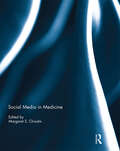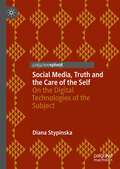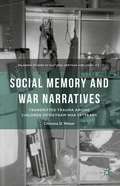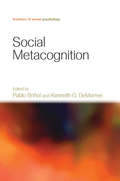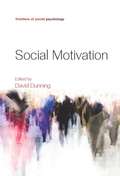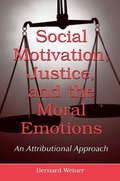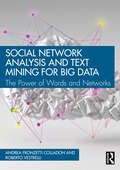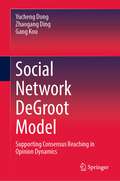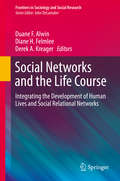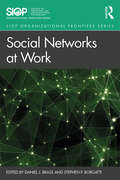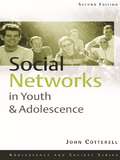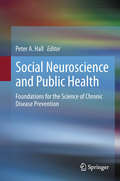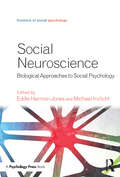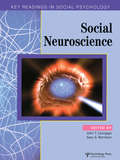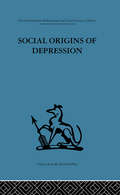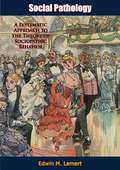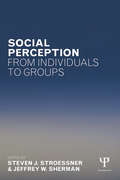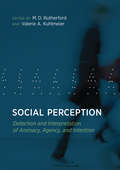- Table View
- List View
Social Media in Medicine
by Margaret S. ChisolmThe use of social media around the world has exploded in recent years, with the number of monthly active users of Facebook and Twitter estimated to be one billion and one quarter billion, respectively. Physicians and medical trainees are among the users of social media, raising questions of how Facebook, Twitter, and other novel online tools may best be harnessed to further medical research, patient care, and educational pursuits. Because social media enables an immediate exchange of information and ideas around shared areas of interest, it has fostered communication and collaboration among a global network of researchers, clinicians, patients, and learners. Social Media in Medicine reviews a range of topics, from research ethics to medical education, and includes personal reflections by clinicians and learners that represent diverse opinions about the role of social media in medicine. The book is relevant to all healthcare stakeholders and will hopefully encourage ideas and questions to generate more research into the use of social media in medical research, patient care, and education. This book was originally published as a special issue of the International Review of Psychiatry.
Social Media, Truth and the Care of the Self: On the Digital Technologies of the Subject
by Diana StypinskaThis book explores the relationship between (post)truth and subjectivity by focusing on social media as a site of digital subjectification. These days, truth is cheap. Anyone can claim it. Indeed, most do – impudently and without any recourse to facts or objective reality. Truth-claims today are nothing but power grabs, employed in the permanent popularity contest that our culture and politics have become. Correspondingly, our very sense of reality is perpetually uprooted. Post-truth sets us adrift. Navigating by smartphones, we pursue endless mirages, coming to wonder whether the shoreline itself is a myth. The book examines the ways in which different digital practices – such as influencing, trolling and digital activism – operate as technologies of the subject, shaping how we relate to ourselves, others and the world. It argues that social media facilitates the progressive eclipsing of our subjective (dis)positions by the economic imperative. Positioning post-truth as the outcome of unbridled economicization, it exposes the true costs of its supremacy. The critical reflections on the relationship between digital subjectification and the social offered by this book will be of relevance to academics and students working in the fields of sociology, media and cultural studies, politics, and philosophy.
Social Memory and War Narratives
by Christina D. WeberThe Vietnam War has had many long-reaching, traumatic effects, not just on the veterans of the war, but on their children as well. In this book, Christina D. Weber examines the concept of the war as a social monad, a confusing array of personal stories and public histories that disrupt traditional ways of knowing the social world. This emphasis draws out the instrumental role the traumatic subject plays in the second generation's articulation of the presence of the Vietnam War. Weber examines the social monad through interviews conducted with children of Vietnam Veterans and social artifacts of the Vietnam War, including Oliver Stone's films on the Vietnam War (Platoon, Born on the Fourth of July, and Heaven and Earth), autobiographies of Vietnam Veterans, and media images of the Vietnam Veteran in current society.
Social Memory in Athenian Public Discourse: Uses and Meanings of the Past
by Bernd SteinbockPrompted by the abundant historical allusions in Athenian political and diplomatic discourse, Bernd Steinbock analyzes the uses and meanings of the past in fourth-century Athens, using Thebes' role in Athenian memory as a case study. This examination is based upon the premise that Athenian social memory, that is, the shared and often idealized and distorted image of the past, should not be viewed as an unreliable counterpart of history but as an invaluable key to the Athenians' mentality. Against the tendency to view the orators' references to the past as empty rhetorical phrases or propagandistic cover-ups for Realpolitik, it argues that the past constituted important political capital in its own right. Drawing upon theories of social memory, it contextualizes the orators' historical allusions within the complex net of remembrances and beliefs held by the audience and thus tries to gauge their ideological and emotive power. Integrating literary, epigraphic, and archaeological evidence with recent scholarship on memory, identity, rhetoric, and international relations, Social Memory in Athenian Public Discourse: Uses and Meanings of the Past enhances our understanding of both the function of memory in Athenian public discourse and the history of Athenian-Theban relations. It should be of interest not only to students of Greek history and oratory but to everybody interested in memory studies, Athenian democracy, and political decision making.
Social Mentality in Contemporary China (Research Series on the Chinese Dream and China’s Development Path)
by Yiyin YangThis book not only seeks to theoretically analyze the concept, chief characteristics and framework of “social mentality”, but also explores the influence of social mentality on such elements of social functioning as individuals, groups, societies, markets and countries, and the influence of such elements as cultural, social, economic, political and mental factors on social mentality. Besides, this book discusses the structure of social mentality, tools for measuring it, and an indicator system. What’s more, it explores the role of the social mentality mechanism in the construction of harmonious societies.
Social Metacognition (Frontiers of Social Psychology)
by Kenneth G. DeMarree Pablo BriñolMetacognition refers to thinking about our own thinking. It has assumed a prominent role in social judgment because our thoughts about our thoughts can magnify, attenuate, or even reverse the impact of primary cognition. Metacognitive thoughts can also produce changes in thought, feeling, and behavior, and thus are critical for a complete understanding of human social behavior. The present volume presents the most important and advanced research areas in social psychology where the role of metacognition has been studied. Specifically, the chapters of this book are organized into four substantive content areas: Attitudes and Decision Making, Self and Identity, Experiential, and Interpersonal. Each section consists in several chapters summarizing much of the work done in recent decades on critical topics, such as attitude strength, persuasion, bias correction, self-regulation, subjective feelings, embodiment, and prejudice, among others. This book also emphasizes interpersonal aspects of metacognition as they play an essential role in close relationships, groups, consumer and clinical interactions. Each chapter is written by an expert in the field, and presents a state-of-the-art view of the many ways metacognition has been examined by social psychologists.
Social Motivation (Frontiers of Social Psychology)
by David DunningMotivational science is one of the fastest-growing areas of research in social psychology, incorporating multiple perspectives from social-personality research. This volume provides students and researchers with a comprehensive overview of major topics in social motivation. All contributors are renowned specialists in their field who provide in-depth and integrated coverage of the major empirical and theoretical contributions in their area. Social Motivation is essential reading for all social psychologists with an interest in social-motivational processes, and will also be of interest to people working in political science and cultural studies looking for a psychological perspective to work in their field.
Social Motivation, Justice, and the Moral Emotions: An Attributional Approach
by Bernard WeinerSocial Motivation, Justice, and the Moral Emotions proposes an attribution theory of interpersonal or social motivation that distinguishes between the role of thinking and feeling in determining action. The place of this theory within the larger fields of motivation and attributional analyses is explored. It features new thoughts concerning social motivation on such topics as help giving, aggression, achievement evaluation, compliance to commit a transgression, as well as new contributions to the understanding of social justice. Included also is material on moral emotions, with discussions of admiration, contempt, envy, gratitude, and other affects not considered in Professor Weiner's prior work. The text also contains previously unexamined topics regarding social inferences of arrogance and modesty.Divided into five chapters, this book:*considers the logical development and structure of a proposed theory of social motivation and justice;*reviews meta-analytic tests of the theory within the contexts of help giving and aggression and examines issues related to cultural and individual differences; *focuses on moral emotions including an analysis of admiration, envy, gratitude, jealousy, scorn, and others;*discusses conditions where reward decreases motivation while punishment augments strivings; and*provides applications that are beneficial in the classroom, in therapy, and in training programs.This book appeals to practicing and research psychologists and advanced students in social, educational, personality, political/legal, health, and clinical psychology. It will also serve as a supplement in courses on motivational psychology, emotion and motivation, altruism and/or pro-social behavior, aggression, social judgment, and morality. Also included is the raw material for 13 experiments relating to core predictions of the proposed attribution theory.
Social Movements that Care: Empathy, Solidarity, and Empowerment in the Fight Against Evictions
by Felipe G. SantosThe Platform of Those Affected by Mortgages (PAH) has left a crucial mark in the history of Spanish social movements by advocating for the over 700,000 families that have been evicted since its inception in 2009. This book explores how the PAH has blocked thousands of evictions through civil resistance, prevented many more through negotiations with banks, and rehoused thousands of evicted families in apartments recuperated from banks and vulture funds. Through the framework of the Politics of Care, Felipe G. Santos explores the emotional, identity, and participatory challenges that hindered the mobilization of those affected by mortgages. The book also reveals how empathy from a group of people unaffected by mortgage issues sparked mobilization, and how care relationships empowered those facing eviction to lead the fight for housing rights.
Social Network Analysis and Text Mining for Big Data: The Power of Words and Networks
by Andrea Fronzetti Colladon Roberto VestrelliSocial Network Analysis and Text Mining for Big Data presents cutting-edge methods and tools that bridge the gap between text mining and social network analysis research while also providing new insights for analyzing (big) textual and network data. These tools are designed to cater to the needs of both business analysts and researchers to facilitate the creation of groundbreaking analytics.Beginning with clear definitions of social network analysis and text mining, this book benefits from a thoughtfully curated selection of methods and tools, drawn from the authors’ extensive research in the field. The focus then shifts to demonstrate how the interplay between words and networks can unlock the full potential of big data analytics. A centerpiece of the book is the Semantic Brand Score (SBS), a versatile and powerful metric for assessing brand importance through text analysis. All of the above is corroborated and illustrated with practical applications and case studies showing the value of these analytics in supporting change and improved managerial decisions. It also introduces a specialized software tool which enables users to perform the analyses detailed in the text.This book is a must-read for business leaders, marketing professionals, policymakers, researchers, and university students. It offers practical insights and actionable advice for achieving increased performance of companies and societal actions. The writing is tailored to make complex concepts accessible to both experienced researchers and readers who are new to the field.
Social Network DeGroot Model: Supporting Consensus Reaching in Opinion Dynamics
by Gang Kou Yucheng Dong Zhaogang DingThis book investigates the DeGroot model in social network contexts, and proposes the social network DeGroot (SNDG) model. Specifically, this book focuses on two core research problems in the SNDG model: (i) Social network structures to reach a stable state (consensus, polarization, or fragmentation); and (ii) the convergence rate to reach a stable state. Furthermore, the authors generalize the SNDG model in an uncertain context, showing the effects of interval opinions on the SNDG model. In this book, the authors also discuss the applications of the SNDG model to support group decision making, including consensus reaching through adding minimum interactions, trust relationships manipulations, and risk control issues in the social network. Apart from theoretical analysis, detailed experimental simulations with real and random data will be applied to validate our research.This book is the first to connect opinion dynamics, social network and group decision making. The resultsreported can help us understand the evolution of public opinions in social network contexts and provide new tools to support consensus reaching in group decision making.
Social Networks and the Life Course: Integrating The Development Of Human Lives And Social Relational Networks (Frontiers In Sociology And Social Research Ser. #2)
by Duane F. Alwin Diane H. Felmlee Derek A. KreagerThis volume engages the interface between the development of human lives and social relational networks. It focuses on the integration of two subfields of sociology/social science--the life course and social networks. Research practitioners studying social networks typically focus on social structure or social organization, ignoring the complex lives of the people in those networks. At the same time, life course researchers tend to focus on individual lives without necessarily studying the contexts of social relationships in which lives are embedded and “linked” to one another through social networks. These patterns are changing and this book creates an audience of researchers who will better integrate the two subfields. It covers the role of social networks across the life span, from childhood and adolescence, to midlife, through old age.
Social Networks at Work (SIOP Organizational Frontiers Series)
by Stephen P. Borgatti Daniel J. BrassSocial Networks at Work provides the latest thinking, from top-notch experts, on social networks as they apply to industrial and organizational (I/O) psychology. Each chapter provides an in-depth review along with discussions of future research and managerial implications of the social network perspective. Altogether, the volume illustrates the importance of adding a social capital perspective to the traditional human capital focus of I/O psychology. The volume is organized into two groups of chapters: the first seven chapters focus on specific network concepts (such as centrality, affect, negative ties, multiplexity, cognition, and structural holes) applied across a variety of topics. The remaining eight chapters focus on common I/O topics (such as personality, creativity, turnover, careers, person–environment fit, employment, teams, and leadership) and examine each from a network perspective, applying a variety of network concepts to the topic. This volume is suited for students and academics interested in applying a social network perspective to their work, as well as for practicing managers. Each topic area provides a useful review and guide for future research, as well as implications for managerial action.
Social Networks in Youth and Adolescence (Adolescence and Society)
by John CotterellThis thoroughly revised new edition looks at the nature of social networks, their changing configurations, and the forces of influence they unleash in shaping the life experiences of young people between the ages of 12 and 25 years. The author draws on both social and psychological research to apply network thinking to the social relations of youth across the domains of school, work and society. Network thinking examines the pattern and nature of social ties, and analyses how networks channel information, influence and support with effects on a wide range of life experiences. The book comprises eleven chapters, which contain discussion on key topics, such as youth transitions, network analysis, friendship, romantic ties, peer victimization, antisocial behaviour, youth risk-taking, school motivation, career influence, youth citizenship, and community organizations for young people. Chapters contain discussions of practical ways in which schools can provide support, and suggestions for youth organizations on how to assist young people to become effective citizens.
Social Networks in Youth and Adolescence (Adolescence and Society)
by John CotterellThis thoroughly revised new edition looks at the nature of social networks, their changing configurations, and the forces of influence they unleash in shaping the life experiences of young people between the ages of 12 and 25 years. The author draws on both social and psychological research to apply network thinking to the social relations of youth across the domains of school, work and society. Network thinking examines the pattern and nature of social ties, and analyses how networks channel information, influence and support with effects on a wide range of life experiences. The book comprises eleven chapters, which contain discussion on key topics, such as youth transitions, network analysis, friendship, romantic ties, peer victimization, antisocial behaviour, youth risk-taking, school motivation, career influence, youth citizenship, and community organizations for young people. Chapters contain discussions of practical ways in which schools can provide support, and suggestions for youth organizations on how to assist young people to become effective citizens.
Social Neuroscience and Public Health: Foundations for the Science of Chronic Disease Prevention
by Peter A. HallThe field of public health is primarily concerned with understanding and improving physical health from a large group perspective (i.e., communities and whole populations). The field of social neuroscience, on the other hand, is primarily concerned with examining brain-behavior relationships that unfold in a social context. Both of these are rapidly developing fields of inquiry, and their boundaries have only recently begun to overlap. This book discusses collaborative research findings at the intersection of social neuroscience and public health that promise to fundamentally change the way scientists, public health practitioners, and the general public view physical health within the larger social context. Eighteen chapters are organized under the following major sections: cognition and health outcomes; neuroscientific aspects of health communication; health behavior and the neurobiology of self-regulation; neurobiological processes in health decision making; ecological and social context; neuroscience methods; and future directions.
Social Neuroscience: Biological Approaches to Social Psychology (Frontiers of Social Psychology)
by Eddie Harmon-Jones and Michael InzlichtSocial Neuroscience provides an updated and critically important survey of contemporary social neuroscience research. In response to recent advances in the field, this book speaks to the various ways that basic biological functions shape and underlie social behavior. The book also shows how an understanding of neuroscience, physiology, genetics, and endocrinology can foster a fuller, more consilient understanding of social behavior and of the person. These collected chapters cover traditional and contemporary social psychology topics that have received conceptual and empirical attention from social neuroscience approaches. While the focus of the chapters is demonstrating how social neuroscience methods contribute to understanding social psychological topics, they also cover a wide range of social neuroscience methods, including hormones, functional magnetic resonance imaging, electroencephalography, event-related brain potentials, cardiovascular responses, and genetics.
Social Neuroscience: Key Readings (Key Readings in Social Psychology)
by John T. Cacioppo Gary G. BerntsonNeuroscientists and cognitive scientists have collaborated for more than a decade with the common goal of understanding how the mind works. These collaborations have helped unravel puzzles of the mind including aspects of perception, imagery, attention and memory. Many aspects of the mind, however, require a more comprehensive approach to reveal the mystery of mind-brain connections. Attraction, altruism, speech recognition, affiliation, attachment, attitudes, identification, kin recognition, cooperation, competition, empathy, sexuality, communication, dominance, persuasion, obedience, morality, contagion, nurturance, violence, and person memory are just a few. Through classic and contemporary articles and reviews, Social Neuroscience illustrates the complementary nature of social, cognitive, and biological levels of analysis and how research integrating these levels can foster more comprehensive theories of the mechanisms underlying complex behaviour and the mind.
Social Order/Mental Disorder: Anglo-American Psychiatry in Historical Perspective (Routledge Library Editions: Psychiatry #21)
by Andrew ScullSocial Order/Mental Disorder represents a provocative and exciting exploration of social response to madness in England and the United States from the eighteenth through the twentieth centuries. Scull, who is well-known for his previous work in this area, examines a range of issues, including the changing social meanings of madness, the emergence and consolidation of the psychiatric profession, the often troubled relationship between psychiatry and the law, the linkages between sex and madness, and the constitution, character, and collapse of the asylum as our standard response to the problems posed by mental disorder. This book is emphatically not part of the venerable tradition of hagiography that has celebrated psychiatric history as a long struggle in which the steady application of rational-scientific principles has produced irregular but unmistakable evidence of progress toward humane treatments for the mentally ill. In fact, Scull contends that traditional mental hospitals, for much of their existence, resembled cemeteries for the still breathing, medical hubris having at times served to license dangerous, mutilating, even life-threatening experiments on the dead souls confined therein. He argues that only the sociologically blind would deny that psychiatrists are deeply involved in the definition and identification of what constitutes madness in our world – hence, claims that mental illness is a purely naturalistic category, somehow devoid of contamination by the social, are taken to be patently absurd. Scull points out, however, that the commitment to examine psychiatry and its ministrations with a critical eye by no means entails the romantic idea that the problems it deals with are purely the invention of the professional mind, or the Manichean notion that all psychiatric interventions are malevolent and ill-conceived. It is the task of unromantic criticism that is attempted in this book.
Social Origins of Depression: A study of psychiatric disorder in women
by Tirril Harris George W BrownTavistock Press was established as a co-operative venture between the Tavistock Institute and Routledge & Kegan Paul (RKP) in the 1950s to produce a series of major contributions across the social sciences. This volume is part of a 2001 reissue of a selection of those important works which have since gone out of print, or are difficult to locate. Published by Routledge, 112 volumes in total are being brought together under the name The International Behavioural and Social Sciences Library: Classics from the Tavistock Press. Reproduced here in facsimile, this volume was originally published in 1978 and is available individually. The collection is also available in a number of themed mini-sets of between 5 and 13 volumes, or as a complete collection.
Social Panics & Phantom Attackers: A Study of Imaginary Assailants
by Robert E. Bartholomew Paul WeatherheadThis book provides an accessible overview of one particular type of social panic: that of the phantom attacker. Such panics are characterised by outbreaks of sensational claims of attacks by mysterious figures that seem to emerge from nowhere, attack their innocent human and animal victims, only to vanish without a trace. Taking the recent wave of needle-spiking reports in Europe as a starting point, this book does more than just catalogue such outbreaks historically and geographically. It also ties the phenomenon of phantom assailants to the moral panics literature. Meticulously investigating archival sources, the authors examine the social construction of social panics and unearth the parallels between contemporary episodes and historical antecedents in Europe, North America, Asia and Africa. Focusing on the sociohistorical and -cultural context, they uncover the role of mass media in creating and perpetuating these panics, which respond to anxieties pervading societies at particular points in history. Written in a lively style, this book is not only of interest for scholars and students of sociology, criminology, social psychology, media studies and history but also appeals to a lay audience interested in urban legends and true crime.
Social Pathology: A Systematic Approach to the Theory of Sociopathic Behavior
by Edwin M. LemertPersons and groups are differentiated in various ways, some of which result in social penalties, rejection, and segregation. These penalties condition the form which the differentiation or deviation takes. Sociopathic differentiation and sociopathic individuation are theoretically considered and applications made to several groups of deviants: the blind, speech defectives, radicals, prostitutes, criminals, alcoholics, and psychotics.—APA
Social Perception from Individuals to Groups
by Jeffrey W. Sherman Steven J. StroessnerThis volume focuses on social perception, the processing of information about people. This issue has always been central to social psychology, but this book brings together literatures that in large part have been separated by the nature of the social target that is involved. Historically, research on person perception developed quite independently from research involving perceptions of groups. Whereas the former research generally focused on the cognitive processes involved in forming impressions of individuals, research on group perception examined the content of stereotypes and the conditions under which they are used in social judgment. There was been little overlap in the theories and methods of these subfields, and different researchers were central in each. The chapters in this book highlight research and theorizing about social perception, exploring the processes involved in social perception from persons to groups. Some chapters describe work that was originally developed in person perception but is being extended to understanding groups. Other chapters illustrate how some processes studied in the domain of stereotyping also affect perceptions of individual persons. Finally, other chapters focus on variables that affect perceptions and judgments of both individuals and groups, proving opportunities for greater recognition of the common set of factors that are central to all types of social perception. This groundbreaking book highlights the research contributions of David L. Hamilton, whose research has played a central role in uniting these previously independent areas of research. It provides essential reading for upper-level courses on social cognition or social perception and could also serve as an auxiliary text in courses on interpersonal perception/relations and courses on stereotyping/intergroup relations.
Social Perception: Detection and Interpretation of Animacy, Agency, and Intention (The\mit Press Ser.)
by Valerie A. Kuhlmeier M. D. RutherfordAn interdisciplinary exploration of perceptual and cognitive processes underlying the ability to perceive social information, drawing on current research and new experimental techniques.As we enter a room full of people, we instantly have a number of social perceptions. We have an automatic perception of others as subjective agents with their own points of view, thoughts, and goals, and we can quickly interpret minimal visual information to infer that something is animate. This book explores the perceptual and cognitive processes that allow humans to perceive and understand this social information quickly and apparently effortlessly. Top researchers in fields ranging from developmental psychology to vision science consider the perception of biological and animate motion, inferences based on this motion, and the early development of these abilities. These innovative contributions reflect a recent renewal of interest in the attribution of agency and the understanding of goal-directed behavior, which has been accompanied by a rapid increase in empirical discoveries enabled by such new experimental techniques as brain imaging. The research presented in Social Perception suggests that an intuitive understanding of others is an integral part of human psychology, develops early, relies on a network of brain regions, and may be compromised in autism.ContributorsDare Baldwin, Lara Bardi, H. Clark Barrett, Erin Cannon, You-jung Choi, Willem E. Frankenhuis, Tao Gao, Emily D. Grossman, Antonia Hamilton, Petra Hauf, Valerie A. Kuhlmeier, Jeff Loucks, Scott A. Love, Yuyan Luo, Elena Mascalzoni, Phil McAleer, Richard Ramsey, Lucia Regolin, M.D. Rutherford, Kara Sage, Brian J. Scholl, Maggie Shiffrar, Francesca Simion, Jessica Sommerville, James P. Thomas, Nikolaus Troje, Amanda Woodward
Social Perspective
by Richard U'RenSocial Perspective explores the impact of social factors on individual health, a topic often overlooked in the practice of psychiatry, psychology, and medicine. Richard U'Ren synthesizes viewpoints and information usually dispersed among many disciplines to show how social roles, political-economic conditions, and the social stratification system all contribute to individual well-being or disorder. U'Ren investigates how access to income, education, and social affiliations buffers individuals against stress and facilitates coping. He demonstrates that those who lack access to such resources suffer the poorest health and the greatest mental distress -- a problem that has only grown more challenging with rising inequality. Adding a new dimension to understandings of mental health, mental illness, and psychological distress, Social Perspective offers clinicians a concise account of society's impact on the individual.
